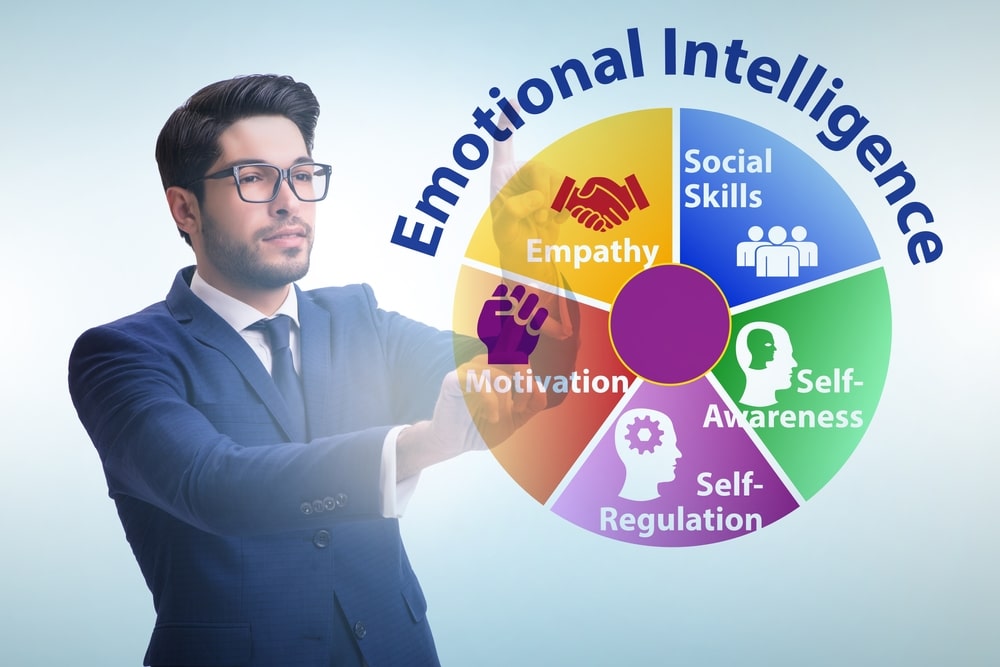Many people struggle with stress and anxiety, often without realizing the tools they already possess to manage them. One of the most powerful yet overlooked tools lies within us — intrapersonal skills.
Intrapersonal skills refer to our ability to understand, manage, and reflect on our own thoughts, emotions, and behaviors. These internal abilities such as emotional self-awareness, self-regulation, and reflective thinking help shape how we handle challenges, make decisions, and cope with stress.
Being emotionally self-aware allows us to recognize what we’re feeling and why we’re feeling it. This simple yet profound insight can prevent minor frustrations from escalating into overwhelming stress. When we understand our inner emotional landscape, we’re better equipped to respond rather than react, making us more emotionally resilient.
In fact, developing intrapersonal skills can play a transformative role in mental well-being. It helps individuals create a sense of emotional balance, build confidence, and reduce the intensity of anxiety. By turning inward and learning to better interpret and manage our emotions, we lay the groundwork for a calmer, more centered life.
In the following sections, we’ll explore how strengthening these internal skills not only reduces stress and anxiety but also empowers you to navigate life with greater clarity and confidence.
1.Understanding the Power of Intrapersonal Abilities
Intrapersonal abilities refer to the internal skills that help you understand, manage, and navigate your own emotions, thoughts, and motivations. These internal strengths play a critical role in shaping your reactions, guiding your decisions, and influencing your overall emotional well-being.
People who develop strong intrapersonal abilities are more in tune with their mental states. They are better equipped to handle pressure, set realistic goals, and recover from emotional setbacks. These abilities are deeply personal but universally impactful, forming the foundation for a stable and resilient mind.
Core Elements That Shape Your Inner Self
Several core elements define how intrapersonal abilities function in daily life:
- Self-awareness
This is your ability to recognize what you’re feeling and why. It helps you become more mindful of emotional patterns and thought processes, which is the first step toward managing them effectively.
- Self-regulation
The capacity to stay calm and composed, especially in stressful situations, comes from emotional regulation. It prevents impulsive decisions and supports long-term emotional stability.
- Introspection
Taking time to reflect on your experiences and inner dialogue allows you to gain deeper insight into your behavior and thought patterns. This clarity helps you grow and make more informed choices.
- Self-motivation
This inner drive pushes you to pursue goals, stay committed through setbacks, and maintain a sense of purpose. People with strong self-motivation are less likely to feel overwhelmed by stress, as they focus more on solutions than on problems.
How These Abilities Differ from Social Skills
Unlike interpersonal skills — which focus on how you relate to others — intrapersonal abilities are about how you relate to yourself. While good communication and empathy help in social settings, intrapersonal abilities help you manage what’s going on internally. Both are essential, but intrapersonal strength often serves as the foundation for healthy interactions with others.
Why Inner Strength Matters for Mental Health
Your mental well-being begins with how you understand and treat yourself. When you’re emotionally self-aware and capable of regulating your thoughts, you create a space for calm, clarity, and constructive action. Instead of being consumed by stress or overwhelmed by anxiety, you gain the ability to respond with intention.
Building intrapersonal strength can lead to greater emotional independence, higher self-confidence, and a more grounded outlook on life. Over time, these inner tools help prevent burnout, reduce anxiety, and promote overall mental resilience.

2. Understanding Stress and Anxiety
Stress and anxiety are natural responses to challenging or uncertain situations, but when they become constant, they can interfere with daily life, relationships, and overall well-being. Understanding what drives these emotional states is the first step in learning how to manage them effectively.
What Causes Stress and Anxiety?
Stress often arises from external pressures — deadlines, financial concerns, relationship conflicts, health problems, or major life changes. Anxiety, on the other hand, tends to be more internal. It’s the mind’s way of responding to perceived threats or anticipating future problems, even when those threats aren’t immediate or real.
Common causes of stress and anxiety include:
- Work or academic pressure
- Chronic illness or health concerns
- Uncertainty about the future
- Negative past experiences
- Sleep deprivation and poor lifestyle habits
Everyone experiences stress and anxiety differently, but the triggers usually stem from situations where a person feels out of control or overwhelmed.
How Our Thoughts and Internal Dialogue Impact These States
Our internal dialogue — the thoughts we silently repeat to ourselves — plays a major role in how we process stress and anxiety. Negative self-talk, catastrophizing, or constant self-criticism can intensify anxiety, making problems seem worse than they really are.
For example, thinking “I’m not good enough” or “This will never get better” can trigger the body’s stress response, leading to increased heart rate, muscle tension, and mental exhaustion. On the other hand, a calm and rational inner voice can reduce the intensity of anxious feelings, even in the same situation.
The way we interpret events matters just as much as the events themselves. In many cases, anxiety stems less from what’s happening around us and more from how we think about what’s happening.
The Cycle of Unmanaged Stress and Negative Emotions
When stress goes unmanaged, it can create a harmful cycle. Stress leads to negative thoughts, which trigger emotional discomfort. That discomfort then leads to more stress, creating a loop that can be hard to escape.
Here’s how the cycle often looks:
- A stressful event or thought occurs
- The mind responds with fear, doubt, or negative self-talk
- Anxiety builds, leading to physical symptoms (tight chest, restlessness, fatigue)
- The person avoids or suppresses the feeling instead of addressing it
- Unresolved emotions create more tension and mental clutter

3. The Role of Intrapersonal Skills in Managing Stress
Managing stress isn’t just about avoiding challenges — it’s about developing the right mindset and internal tools to handle them with clarity. Intrapersonal skills offer a powerful framework for understanding and diffusing stress before it takes control. By strengthening your inner abilities, you gain the awareness and emotional flexibility to stay grounded in high-pressure situations.
Self-awareness: Recognizing Early Signs of Stress
The first step in managing stress is knowing when it’s happening. Self-awareness allows you to identify early warning signs — such as irritability, fatigue, restlessness, or physical tension — before stress escalates. When you’re aware of how your body and mind respond to pressure, you can take action early rather than reacting too late.
Being in tune with your emotions also helps you pinpoint what exactly is causing your stress, making it easier to address the root rather than just the symptoms.
Emotional Regulation: Managing Triggers and Reactions
In stressful moments, emotions can feel overwhelming. Intrapersonal skills like emotional regulation help you stay composed rather than letting stress dictate your behavior. Instead of lashing out, withdrawing, or panicking, you learn to pause, breathe, and choose your response consciously.
This skill is especially useful when facing recurring stressors — such as work challenges or personal conflicts — because it helps you respond with logic and calm rather than emotional reactivity.
Self-talk: Replacing Negative Thoughts with Positive, Constructive Ones
The voice inside your head can either calm you down or make stress worse. Negative self-talk — “I can’t handle this” or “Everything is falling apart” — fuels anxiety and panic. In contrast, positive and realistic self-talk can help ground your thoughts and provide reassurance.
Practicing constructive inner dialogue like “I’ve handled difficult things before” or “This feeling is temporary” can shift your mental state and reduce emotional intensity.
Decision-making: Reducing Anxiety by Making Clear, Confident Choices
Stress often comes from indecision or fear of making the wrong choice. Intrapersonal skills support better decision-making by helping you assess situations objectively, weigh pros and cons, and trust your judgment.
When you feel more confident in your decisions, anxiety loses its grip. You begin to take control instead of feeling at the mercy of circumstances.
Mindfulness and Introspection: Tools for Calming the Mind
Mindfulness involves staying present and observing your thoughts and feelings without judgment. Introspection involves looking inward to better understand those thoughts and feelings. Together, they serve as powerful tools for calming the mind.
Regular mindfulness practices — like deep breathing, meditation, or mindful journaling — train your brain to stay centered. They also create space between your emotions and your reactions, allowing you to process stress more peacefully.
When intrapersonal skills are developed intentionally, they act as a personal stress management system. Rather than being overwhelmed by life’s demands, you build a sense of emotional clarity, resilience, and calm from within.
4. Intrapersonal Techniques to Reduce Anxiety
Anxiety often thrives in the absence of clarity and control. By engaging in simple, consistent intrapersonal practices, you can create a sense of inner stability and reduce the intensity of anxious thoughts. These techniques don’t require expensive tools or therapy sessions — they rely on your ability to reflect, refocus, and reconnect with yourself.
Journaling for Reflection
Journaling is one of the most effective tools for managing anxiety. Writing down your thoughts helps release mental clutter, clarify emotions, and identify recurring stress patterns. You don’t need to be a writer — even a few sentences a day about how you’re feeling and why can offer emotional relief.
Reflective journaling can also help you spot triggers and irrational fears. Over time, it becomes easier to separate facts from anxious thoughts and respond with more balanced thinking.
Daily Self-Check-ins
Pausing for a few minutes each day to ask yourself how you’re doing creates emotional awareness and control. A daily self-check-in might involve asking:
What emotions am I feeling right now?
What’s been on my mind today?
What do I need to feel more balanced?
These moments of self-inquiry reduce emotional buildup and offer an opportunity to adjust your mindset before anxiety escalates.
Visualization and Goal-Setting
Anxiety often stems from uncertainty and fear of the future. Visualization helps counter this by painting a clear mental picture of positive outcomes. When you visualize yourself handling challenges with confidence, you train your brain to believe it’s possible — which reduces fear and builds self-trust.
Pair this with realistic goal-setting. Break your goals into small, achievable steps. As you meet each one, it strengthens your sense of control and lowers feelings of helplessness.
Gratitude Practice
Gratitude is a powerful antidote to anxiety. When your mind focuses on what’s lacking or what could go wrong, stress naturally follows. Practicing gratitude — by noting three things you’re thankful for each day — helps shift your focus to the positive.
This simple habit fosters a sense of abundance and emotional grounding, which can counteract the fear-driven mindset that anxiety creates.
Breathing and Grounding Techniques
When anxiety hits, your body often responds before your mind can catch up — increased heart rate, shallow breathing, tension. Breathing techniques, such as deep belly breathing or box breathing, help regulate your nervous system and bring you back to the present.
Grounding techniques like the “5-4-3-2-1” method (noticing five things you see, four you can touch, three you hear, two you smell, one you taste) engage your senses and shift focus away from anxious thoughts.
5. Building Your Intrapersonal Skills: A Practical Guide
Strengthening your intrapersonal skills isn’t something that happens overnight — it’s a gradual process built on small, intentional habits. Just like physical fitness, emotional fitness requires consistency and patience. The more you work on understanding and managing your inner world, the more equipped you become to face life’s stressors with clarity and strength.
Habits to Foster Better Self-Awareness
Self-awareness forms the foundation of all intrapersonal growth. Start by observing your thoughts and emotions without judgment. Try setting aside just 5–10 minutes daily to reflect on questions like:
- What emotion did I feel the most today?
- When did I feel most at peace or most stressed?
- What triggered those feelings?
You can build this habit through journaling, meditation, or simply pausing during the day to check in with yourself. Over time, you’ll begin to notice patterns, making it easier to manage your responses and behaviors more mindfully.
How to Create a Safe Space for Reflection
To truly reflect, your mind needs a space free from distractions and judgment. That doesn’t mean you need a meditation room — it just means setting boundaries that allow you to pause and process your thoughts peacefully.
Start with:
- Turning off devices for a few minutes each day
- Sitting in a quiet corner or taking a walk in nature
- Practicing deep breathing to center your mind
Creating this intentional space signals to your brain that it’s safe to explore emotions and thoughts honestly — a key step in inner growth.
Setting Personal Boundaries and Priorities
Understanding your limits is just as important as understanding your emotions. Intrapersonal skills help you recognize when to say “no,” what drains your energy, and where your attention should go.
Set boundaries by:
- Identifying situations or people that consistently cause stress
- Being clear about your time and emotional availability
- Prioritizing rest, self-care, and alone time without guilt
When your life aligns with your values and priorities, your inner world becomes more balanced — making you less vulnerable to unnecessary anxiety or burnout.
Long-Term Emotional Resilience Through Inner Growth
Emotional resilience doesn’t mean avoiding pain or discomfort — it means learning to move through it with strength and self-awareness. Intrapersonal growth teaches you how to bounce back from setbacks, learn from experiences, and remain emotionally grounded through life’s ups and downs.
Focus on:
- Embracing challenges as opportunities to grow
- Practicing compassion toward yourself during difficult times
- Celebrating your small wins and inner progress
Over time, these practices build a strong emotional foundation that supports not only stress management but also lasting mental well-being.
6. Intrapersonal Growth and Mental Health Therapy
While self-guided techniques are powerful, working with a mental health professional can significantly accelerate your intrapersonal development. Therapy offers a structured, supportive environment to better understand yourself, process emotions, and build healthier mental habits. For many, therapy becomes the bridge between emotional struggle and true inner growth.
How Therapy Enhances Intrapersonal Development
Certain therapeutic approaches — like Cognitive Behavioral Therapy (CBT) and mindfulness-based therapy — are specifically designed to improve intrapersonal skills.
- CBT helps you recognize negative thought patterns, challenge limiting beliefs, and develop healthier ways of thinking and behaving. It directly supports skills like self-awareness, emotional regulation, and decision-making.
- Mindfulness-based therapy focuses on helping individuals stay present, observe their thoughts without judgment, and respond rather than react. This kind of practice deepens introspection and promotes emotional clarity.
Through therapy, individuals learn to:
- Identify the roots of their anxiety and stress
- Reframe harmful thoughts into supportive inner dialogue
- Cultivate deeper self-compassion and emotional awareness
Therapy doesn’t just treat symptoms — it empowers people to develop long-lasting intrapersonal strength.
When to Seek Professional Help
It’s completely normal to seek help when managing stress and anxiety becomes too difficult alone. You might consider reaching out to a therapist if you:
- Feel overwhelmed by your thoughts or emotions on a daily basis
- Experience panic attacks, chronic anxiety, or depressive symptoms
- Struggle with decision-making, motivation, or self-worth
- Notice that stress is affecting your relationships, sleep, or physical health
Seeking therapy isn’t a sign of weakness — it’s a proactive step toward healing and personal growth. In fact, those who pair therapy with intrapersonal work often report stronger self-awareness and faster emotional recovery.
Combining Therapy with Self-Led Practices
The most effective path to mental clarity often includes both professional guidance and personal reflection. Therapy sessions can provide insights and techniques, while self-led practices like journaling, meditation, and gratitude help reinforce progress between sessions.
Here’s how to combine both for maximum benefit:
- Use therapy to uncover blind spots and explore emotional patterns
- Apply what you learn through daily journaling or self-check-ins
- Practice mindfulness or breathing exercises to stay grounded
- Reflect on therapy discussions and track your emotional growth over time
This balanced approach creates a feedback loop — therapy deepens your self-understanding, and your intrapersonal habits reinforce what you learn.
Final Thoughts
Intrapersonal skills play a powerful role in helping individuals manage stress and anxiety. By becoming more self-aware, regulating emotions, and practicing mindful decision-making, you gain better control over how you react to pressure and emotional challenges. These internal abilities help break the cycle of stress and allow for a calmer, more thoughtful response to life’s demands.
Developing these skills takes time and consistency, but the long-term rewards are worth the effort. As you build emotional clarity and resilience, you’ll experience greater mental stability, improved confidence, and a deeper sense of personal satisfaction. Small, intentional steps today can lead to lasting emotional strength tomorrow.
People Also Ask
- What are examples of intrapersonal skills that reduce stress?
Examples include self-awareness, emotional regulation, self-reflection, positive self-talk, and mindfulness. These skills help you recognize stress triggers early and respond calmly rather than react impulsively.
- How does self-awareness help with anxiety?
Self-awareness allows you to identify anxious thoughts and emotional triggers as they arise. This clarity helps you pause, reflect, and manage your response — preventing anxiety from escalating.
- Can intrapersonal skills be developed over time?
Yes, intrapersonal skills can be improved with regular practice. Techniques like journaling, mindfulness, self-check-ins, and therapy can strengthen emotional insight and self-regulation over time.
- What’s the difference between coping mechanisms and intrapersonal skills?
Coping mechanisms are short-term strategies to manage stress or discomfort, while intrapersonal skills are long-term internal abilities that help you understand and regulate your emotions. Both are useful, but intrapersonal skills offer deeper emotional resilience.
- Do intrapersonal skills help with panic attacks?
Yes, intrapersonal skills like grounding techniques, controlled breathing, and positive self-talk can help manage panic attacks. These tools improve emotional regulation and make it easier to stay calm during intense episodes.



